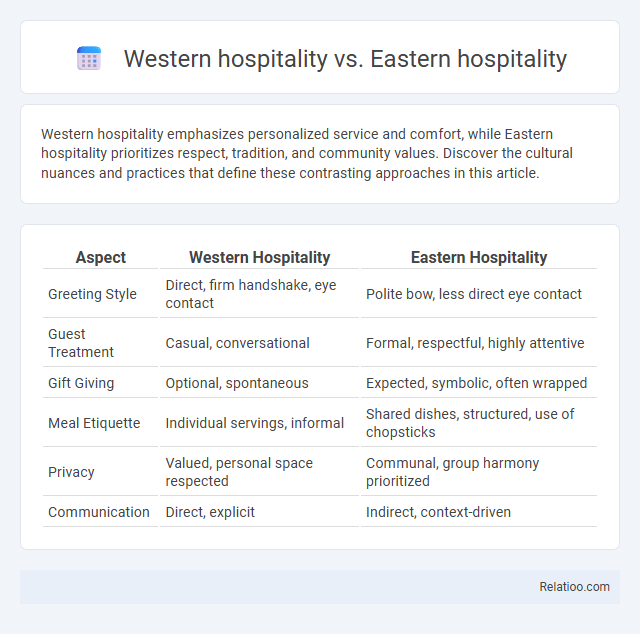Western hospitality emphasizes personalized service and comfort, while Eastern hospitality prioritizes respect, tradition, and community values. Discover the cultural nuances and practices that define these contrasting approaches in this article.
Table of Comparison
| Aspect | Western Hospitality | Eastern Hospitality |
|---|---|---|
| Greeting Style | Direct, firm handshake, eye contact | Polite bow, less direct eye contact |
| Guest Treatment | Casual, conversational | Formal, respectful, highly attentive |
| Gift Giving | Optional, spontaneous | Expected, symbolic, often wrapped |
| Meal Etiquette | Individual servings, informal | Shared dishes, structured, use of chopsticks |
| Privacy | Valued, personal space respected | Communal, group harmony prioritized |
| Communication | Direct, explicit | Indirect, context-driven |
Defining Western and Eastern Hospitality
Western hospitality emphasizes individualism, often characterized by casual, service-oriented interactions prioritizing guest comfort and privacy. Eastern hospitality centers on collectivism, deeply rooted in cultural rituals and respect, where hosts go above and beyond to ensure guests feel honored and valued. Hospitality obligation in the East typically involves a moral and social duty to provide generous care, contrasting with the more transactional and service-driven approach commonly found in Western contexts.
Historical Roots of Hospitality Traditions
Western hospitality has its roots in Greco-Roman customs emphasizing guest-friendship (xenia) and religious rites honoring strangers, reflecting a blend of social duty and divine observance. Eastern hospitality stems from Confucian, Buddhist, and Islamic traditions, prioritizing selflessness, respect, and community honor as moral imperatives. Hospitality obligation across cultures often originates from ancient legal codes and religious doctrines mandating the care of travelers, embedding hospitality as a societal and spiritual responsibility.
Core Values: Individualism vs. Collectivism
Western hospitality often emphasizes individualism, highlighting personal choice, privacy, and tailored guest experiences reflecting autonomy and self-expression. Eastern hospitality prioritizes collectivism, focusing on group harmony, respect for social roles, and fulfilling communal duties to ensure guests feel included and honored. Hospitality obligation in Eastern cultures is deeply rooted in social harmony and reciprocal relationships, whereas Western hospitality values voluntary generosity and personal discretion.
Hospitality in the Home: Welcoming Guests
Western hospitality emphasizes comfort and privacy in the home, offering personalized experiences and modern amenities to make your guests feel valued. Eastern hospitality often involves elaborate rituals and a deep sense of duty, where hosting is seen as an honor requiring meticulous attention to guests' needs. Hospitality obligation in many cultures mandates generous welcoming practices, reflecting respect and social harmony through shared meals and open homes.
Rituals and Customs in Hosting
Western hospitality often emphasizes casual social rituals such as offering refreshments and engaging in light conversation to create a relaxed atmosphere for guests. Eastern hospitality prioritizes elaborate customs, including specific greetings, gift-giving, and ceremonial serving orders that reflect respect and hierarchy. Hospitality obligation in many cultures involves strict adherence to traditional rituals and customs, ensuring hosts fulfill social expectations and demonstrate honor through meticulous attention to guests' comfort and ceremonial practices.
Food and Dining Etiquette: East vs. West
Western hospitality emphasizes individual choice and casual dining settings, often featuring buffet-style meals or self-service, reflecting a culture of convenience and personal preference. Eastern hospitality prioritizes communal dining with shared dishes, strict table manners, and respect for hierarchy, highlighting collective harmony and reverence for guests. Hospitality obligation in Eastern cultures often mandates offering the best quality food and ensuring guests finish their plates, symbolizing respect, whereas Western norms allow guests more freedom in food selection and portioning as a gesture of personal comfort.
Gift-Giving Practices Across Cultures
Western hospitality often emphasizes casual gift-giving, focusing on thoughtful but informal presents like wine or flowers to express appreciation. Eastern hospitality typically involves more elaborate and symbolic gifts, such as tea sets or lacquerware, where the presentation and reciprocity play significant roles in maintaining social harmony. The obligation to give gifts varies culturally, with Eastern traditions viewing it as a duty reinforcing relationships, while Western practices regard gift-giving as a voluntary gesture of goodwill.
Hospitality in Business Settings
Western hospitality in business settings emphasizes professionalism, efficiency, and clear boundaries, often involving formal meetings and structured networking events. Eastern hospitality prioritizes building long-term relationships through personalized care, generous hosting, and respect for hierarchy, frequently incorporating rituals such as offering tea or gifts. Hospitality obligation varies culturally, with Eastern practices rooted in Confucian or collectivist values demanding reciprocity and loyalty, while Western norms favor contractual agreements and individual autonomy.
Modern Influences and Globalization
Western hospitality emphasizes personalized service and privacy, often influenced by commercial and individualistic values, while Eastern hospitality prioritizes collective respect, ritual, and long-standing cultural traditions. Modern influences and globalization have led to a fusion where Western efficiency meets Eastern ceremonial warmth, creating diverse hospitality experiences that cater to international guests' expectations. Understanding these shifts helps you navigate hospitality obligations within globalized contexts, blending cultural authenticity with modern service standards.
Lessons and Takeaways from Both Traditions
Western hospitality often emphasizes personal space and individual comfort, highlighting efficiency and casual interactions, while Eastern hospitality prioritizes respect, formality, and collective well-being. Understanding these differences teaches you the value of blending warmth with respect, adapting to diverse cultural expectations to create inclusive and meaningful guest experiences. Embracing lessons from both traditions enhances your ability to offer genuine hospitality that balances personal attention with cultural sensitivity.

Infographic: Western hospitality vs Eastern hospitality
 relatioo.com
relatioo.com